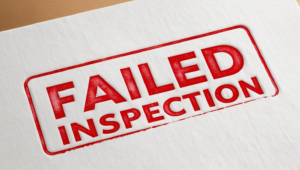Top 10 ways to fail your DEA Inspection

ProTip – these are all things you can address at your facility to help reduce the risk of fines or loss of license
Incomplete or Inaccurate Records – Failure to maintain accurate and complete records of controlled substances, including inventory, receipt, distribution, and disposal records.
Inaccurate records includes logs missing key information points, mathematical errors, missed entries, duplicate entries, entries that do not match your patient records, missing records of disposal and more.
Inability to Provide a Biennial Inventory – The DEA requires that all required records, forms and documents, starting with the biennial controlled substance inventory, be available for inspection upon request at the location matching the registration. The inability to produce a biennial inventory is an easy way to get an automatic fail and fine.
If you have been open for 2 years, you should have at least 1 biennial inventory count to show.
Records not being “readily retrievable” – The last thing you want is to have to sort through files and stacks of papers while the DEA is on-site. It is your responsibility as the registrant to have these documents organized and ready to share.
Infrequent Reconciliations – Failure to reconcile and explain the reasons for the discrepancies can dig you a hole too large to climb out of. Hub loss and manufacture overfill are two very common rational reasons for discrepancies. Delays in logging them results on large amounts of medication to account for.
Failure to Report Theft or Loss – Not reporting theft or significant loss of controlled substances using DEA Form 106.
Lack of Security Measures – The DEA requires adequate physical security measures to prevent the theft or diversion of controlled substances. This should include the use of video surveillance over and around controlled substance storage areas with 60 – 90 days of retained footage for review when necessary, employee screening, and even drug testing. Speak with your HR attorney to ensure drug testing is correctly incorporated into company policies.
Unauthorized Personnel Handling Controlled Substances – Always have an up to date list of all employees authorized by the registrant to handle controlled substances at your facility. This includes front desk staff who may hand take-home medications to a patient.
Failure to Obtain Required Licenses or Registrations – Practicing on more than one state? Make sure you have all appropriate registrations to handle controlled substances for each state you practice in. Does your state also require a state DEA registration?
Poor employee vetting – Though background checks aren’t listed as “required” they are implied in the phrase adequate physical security measures to prevent the theft or diversion of controlled substances. In the event of an internal theft, the DEA will ask why, if employees have not been background checked and drug screened before having access to controlled substances.
Improper Document Storage – Maintaining Schedule II medication records with any others. Separate storage is required, and they must not co-mingle. Upon inspection an agent may ask for Schedule II medications records only if that is their area of concern. If you hand over piles of paperwork for them to sort through, they will not only be unimpressed, but will absolutely slap you with a violation and likely fine right then and there.
Remember that fines are assigned per violation. Mathematical errors in your logbook common? How many are there right now? Missing a patient address? How many other are there? They add up rather quickly. Address them now before being assigned upwards of $18,000 per mistake.
